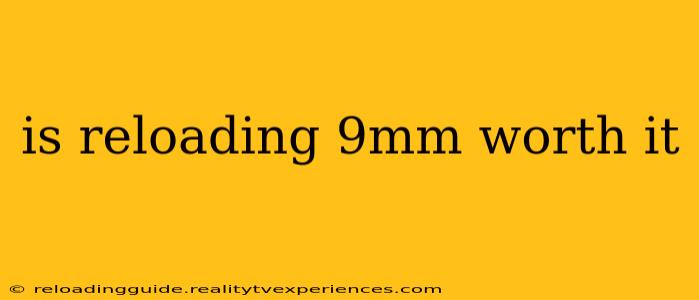The question of whether reloading 9mm is worthwhile is a common one among shooters, particularly in today's climate of fluctuating ammunition prices and occasional shortages. The answer, as with most things, is "it depends." This comprehensive guide will delve into the financial, practical, and logistical aspects to help you determine if reloading 9mm is the right choice for you.
The Financial Argument: Cost Savings and Long-Term Investment
The primary driver for many considering reloading is cost savings. Compared to buying factory ammunition, reloading 9mm can significantly reduce your expenses, especially if you shoot frequently. However, the upfront investment in equipment can be substantial. You'll need a reloading press, dies, case trimmer, powder measure, scale, and various other tools.
Calculating Your Return on Investment (ROI)
To determine if reloading will save you money, calculate your anticipated shooting volume and compare the cost of factory ammo to the cost of reloading. Factor in:
- Initial Equipment Costs: This includes the press, dies, scale, etc. Prices vary widely depending on brand and quality.
- Component Costs: This encompasses bullets, powder, primers, and cases. Prices fluctuate based on market conditions.
- Ammunition Consumption: How much 9mm ammunition do you plan to shoot annually?
- Time Investment: Reloading is time-consuming. Factor in the value of your time when calculating overall costs.
Example: Let's say your initial investment is $500, and you shoot 1000 rounds of 9mm per year. If factory ammo costs $0.50 per round, and your reloading cost per round is $0.30, you'll save $200 per year. Your ROI would be achieved after 2.5 years (500/200). However, if you shoot less, your ROI will take longer.
Practical Considerations: Time, Skill, and Safety
Reloading 9mm requires patience, attention to detail, and a commitment to safety. It's not a fast process; expect it to take considerably longer than simply buying factory ammo.
Essential Skills and Safety Precautions
- Precision and Accuracy: Reloading demands precise measurements of powder and meticulous attention to detail in every step of the process. Inaccuracy can lead to dangerous malfunctions or even explosions.
- Safety First: Always adhere to strict safety guidelines. Work in a well-ventilated area, wear appropriate safety glasses and hearing protection, and thoroughly familiarize yourself with reloading procedures before starting.
- Learning Curve: There's a learning curve involved. Start with small batches and gradually increase your volume as your skills improve. Consider taking a reloading class for proper instruction.
Logistical Aspects: Sourcing Components and Storage
Sourcing components consistently can be challenging. You'll need to find reliable suppliers for bullets, powder, primers, and cases. Availability can fluctuate, and you might need to explore different vendors.
Proper Storage and Organization
Proper storage is crucial for the longevity and safety of your components. Powder, primers, and ammunition should be stored in a cool, dry, and secure location, away from sources of ignition.
The Verdict: Is Reloading 9mm Right for You?
Reloading 9mm can be a rewarding and cost-effective endeavor for serious shooters who prioritize accuracy, consistency, and cost savings. However, it's a significant time investment and requires a commitment to learning the necessary skills and adhering to safety protocols. If you shoot frequently and value control over your ammunition's quality and consistency, the benefits likely outweigh the costs. If you only shoot occasionally, the upfront investment and time commitment might not be justified. Carefully weigh the financial, practical, and logistical factors to determine if reloading 9mm is the right choice for your specific needs and circumstances.

